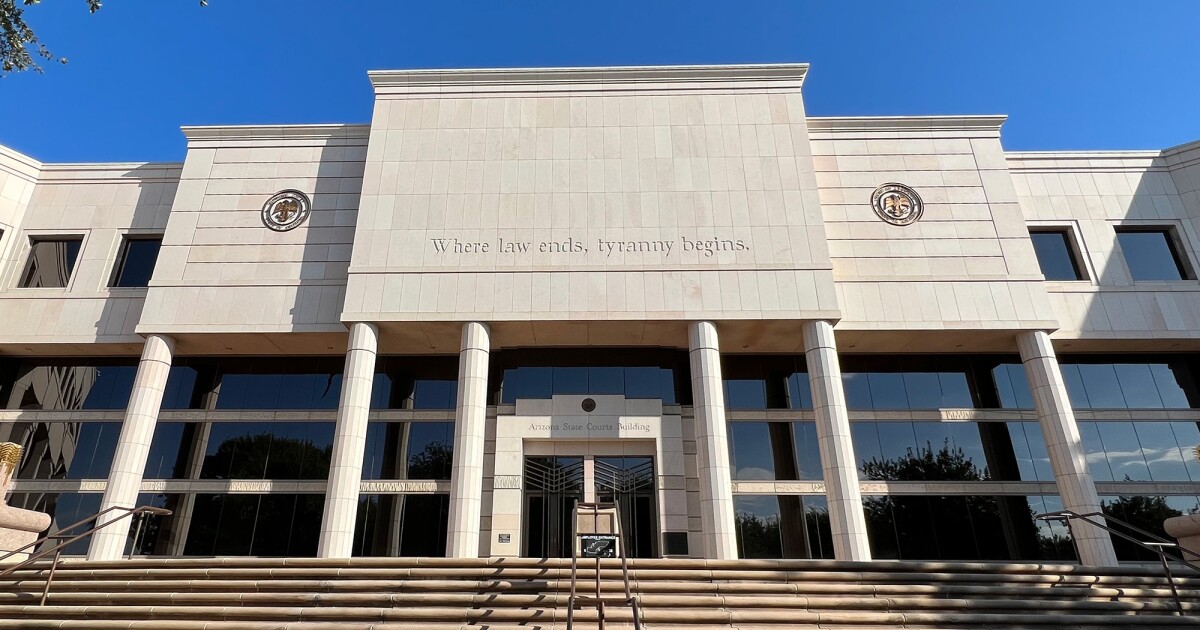Arizona Supreme Court justices heard arguments on Thursday challenging a measure that requires political groups to identify certain donors to their causes.
Proposition 211 generally requires groups that spend a certain amount of money to influence elections to disclose where that money comes from.
Ever since voters overwhelmingly approved the voter initiative in 2022 (72% to 28%), it has been mired in legal challenges by conservative groups like the Center for Arizona Policy and the Arizona Free Enterprise Club that argue Arizonans have a right to privacy, and that identifying donors will scare people away from making donations at all.
Eric Fraser, an attorney for the Citizens Clean Election Commission, told the court such arguments are misleading.
“Plaintiffs focus on anonymity and doxing and the like are red herrings because somebody is going to be disclosed, that’s what our constitution requires, so the only question is who gets to be disclosed?” he said.
Fraser argued voters have a right to know who influences elections, and noted that disclosure can have an impact on how voters cast their ballots.
Fraser also pushed back on the idea that the crafters of Arizona’s constitution had anonymous political financial contributions in mind when they wrote free speech protections.
“Anonymous donations were not ‘speech’ at the time of the founding. ‘Speaking’ in 1910, 1912 meant making sounds with your voice. It doesn’t mean anonymous donations of money,” Fraser said.
Following the hearing, Goldwater Institute Vice President of Legal Affairs Timothy Sandefur said identifying donors will scare people away from making donations at all.
“You hear people use the term transparency and say you have to have more transparency in the political process, but the answer to that is, transparency is for the government, privacy is for people,” he said.
Attorneys defending the law told the Supreme Court that voters have a right to know who influences their elections, noting that disclosure can have an impact on how voters cast their ballots.
Under the language of Prop 211, entities that spend more than $50,000 on campaigns have to reveal the source of any donations of more than $5,000.
Fraser argued that we just went through the 2024 campaign season with this law in effect, and nothing bad happened to donors. But, Justice John Lopez questioned whether today’s political climate should be taken into effect.
“Take for example Tesla owners,” Lopez said. “People who own a product that they purchased often well before the owner of the company became overtly and enthusiastically involved in supporting a political candidate, there are scores of well-publicized violent attacks on those people and their property for their perceived support of an individual where the perception is irrational in most instances and wrong.”
Fraser said in response that the founders of the Arizona Constitution chose sunlight over darkness.
Former Supreme Court Justice and attorney for the Center for Arizona Policy Andrew Gould referenced the NAACP v. Alabama case from 1958. In that case, the U.S. Supreme Court ruled that the NAACP couldn’t be forced to reveal its membership lists, protecting the members from facing retaliation.
At a press conference following Thursday’s hearing, attorneys against Prop. 211 spoke about the assassination of Turning Point USA co-founder Charlie Kirk on Wednesday — citing it as an example of the political violence they want to protect donors from.
“We live in a very dangerous time where people are retaliated against, they’re harassed, they’re ostracized for their views. And what this law does is, it takes people who want to anonymously express themselves through organizations that will speak on their behalf, It denies them that right. It strips them of that anonymity, and it exposes them to retaliation and every form from violence to economic retaliation to social ostracism,” Gould said.
Arizona Free Enterprise Club President Scot Mussi said Prop. 211 has harmed his organization because the club had to “curtail” its speech to ensure the anonymity of donors.
The Supreme Court has the matter under advisement. Its decision will decide the fate of Prop 211, as it has already been through the lower courts. The Superior Court and Court of Appeals ruled in favor of upholding the law.
